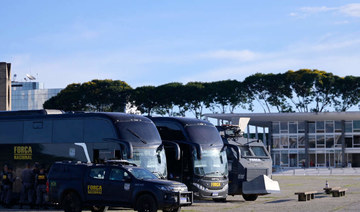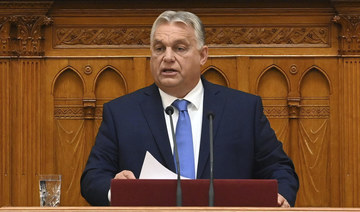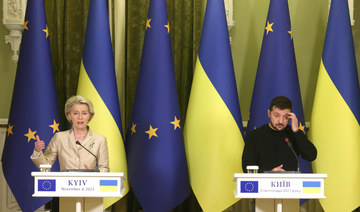SAO PAULO: Far-right former Brazilian President Jair Bolsonaro was barred Friday from running for office again until 2030 after a panel of judges concluded that he abused his power and cast unfounded doubts on the country’s electronic voting system.
The decision upends the 68-year-old’s political future and likely erases any chance for him to regain power.
Five judges on the nation’s highest electoral court agreed that Bolsonaro used government communication channels to promote his campaign and sowed distrust about the vote. Two judges voted against the move.
“This decision will end Bolsonaro’s chances of being president again, and he knows it,” said Carlos Melo, a political science professor at Insper University in Sao Paulo. “After this, he will try to stay out of jail, elect some of his allies to keep his political capital, but it is very unlikely he will ever return to the presidency.”
The case focused on a July 18, 2022, meeting where Bolsonaro used government staffers, the state television channel and the presidential palace in Brasilia to tell foreign ambassadors that the country’s electronic voting system was rigged.
In her decisive vote that formed a majority, Judge Carmen Lucia — who is also a Supreme Court justice — said “the facts are incontrovertible.”
“The meeting did take place. It was convened by the then-president. Its content is available. It was examined by everyone, and there was never a denial that it did happen,” she said.
Alexandre de Moraes, also a Supreme Court justice, said the decision represents rejection of “populism reborn from the flames of hateful, antidemocratic speech that promotes heinous disinformation.”
Speaking to reporters in Minas Gerais, Bolsonaro lamented that the trial was unfair and politically motivated.
“We’re going to talk with the lawyers. Life goes on,” he said when asked what his next step would be. He called the ruling an attack on Brazilian democracy. “It’s a rather difficult moment.”
Melo said the decision is “very unlikely” to be overturned. It removes Bolsonaro from the 2024 and 2028 municipal elections as well as the 2026 general elections. The former president also faces other legal troubles, including criminal investigations. Future criminal convictions could extend his ban by years and subject him to imprisonment.
Former President Fernando Collor de Mello and current President Luiz Inácio Lula da Silva were declared ineligible in the past, but Bolsonaro’s case marks the first time a president has been suspended for election violations rather than a criminal offense. Brazilian law forbids candidates with criminal sentences from running for office.
Lula’s eligibility was reinstated by Brazil’s top court following rulings that then-judge and now Sen. Sergio Moro was biased when he sentenced the leftist leader to almost 10 years in prison for corruption and money laundering.
Maria Maris, a 58-year-old engineer in Rio de Janeiro, celebrated the ruling, though said she suspects it may have been politically motivated.
“My fear is that Bolsonaro appeals and runs in the next presidential election, even though he was made ineligible today,” Maris said.
Bolsonaro holds a ceremonial leadership role within his Liberal Party and has traveled around Brazil criticizing Lula, who won last October’s election with the narrowest margin in over three decades.
Thousands of Bolsonaro supporters stormed government buildings on Jan. 8 — one week after Lula took power — in an attempt to oust the leftist from power. Swift jailing and prosecution of hundreds of those who participated had a chilling effect on their rejection of the election’s results. Federal police are investigating Bolsonaro’s role in inciting the uprising; he has denied any wrongdoing.
The chairwoman of Lula’s Workers’ Party, Gleisi Hoffmann, said on her social media channels that Bolsonaro’s ineligibility offers a teachable moment.
“The far-right needs to know that the political struggle takes place within the democratic process, and not with violence and threatening a coup,” she said. Bolsonaro “will be out of the game because he doesn’t respect the rules. Not only him, his whole gang of coup mongers has to follow the same path.”
The trial has reenergized Bolsonaro’s base online, with supporters claiming he is a victim of an unfair judicial system and comparing his fate to that of former US President Donald Trump, according to Marie Santini, coordinator of NetLab, a research group at the Federal University of Rio de Janeiro that monitors social media.
However, that engagement pales in comparison to the levels seen ahead of last year’s polarizing election.
The expression of Katia Caminha, a 67 year-old retiree in Rio de Janeiro’s Copacabana neighborhood, crumbled upon hearing the news that a majority of judges had voted against Bolsonaro. She told The Associated Press that she thought the whole trial had been a “clown show.”
“Everything that has to do with the electoral court is biased and against” Bolsonaro. “This is terrible news for Brazil,” Caminha said.
This week, his supporters showed their continued support with contributions to help him pay 1.1 million reais (about $230,000) in fines levied by Sao Paulo state’s government for Bolsonaro’s repeated violations of health protocols during the COVID-19 pandemic.
While Bolsonaro aims to be the right’s kingmaker, and his endorsement will carry significant heft, his decision to decamp to Florida for several months at the start of Lula’s term weakened him, said Thomas Traumann, a political analyst. That is reflected by the limited right-wing outrage on social media throughout the eligibility trial, and no sign of protests.
“There won’t be a mass movement, because he diminished in size. The fact that he went to Florida and didn’t lead the opposition caused him to diminish in size,” Traumann said. “The leader of the opposition is clearly not Bolsonaro.”
As the trial drew to a close, a trumpeter standing outside the electoral court played the song that became a sensation during last year’s presidential race: “It is Time for Jair to Go Away.”


























